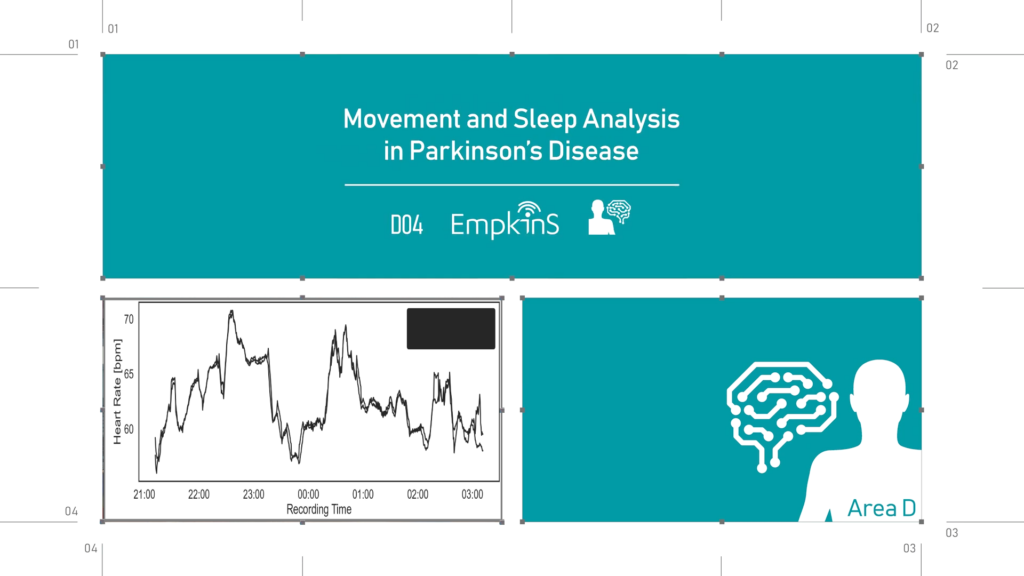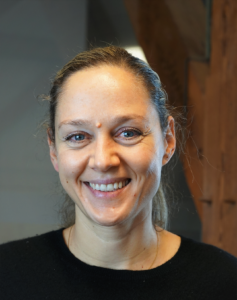Subproject D04
Subproject D04
Sensor-Based Movement and Sleep Analysis in Parkinson’s Disease
In D04, innovative, non-contact EmpkinS sensor technology using machine learning algorithms and multimodal reference diagnostics is evaluated using the example of Parkinson’s-associated sleep disorder patterns. For this purpose, body function parameters of sleep are technically validated with wearable sensor technology and non-contact EmpkinS sensor technology in comparison to classical polysomnography and correlated to clinical scales. In an algorithmic approach, multiparametric sleep parameters and sleep patterns are then evaluated in correlation to movement, respiratory, cardiovascular, and sleep phase regulation disorders. Thereby, using the combination of intelligent Machine Learning algorithms and contactless EmpkinS Sensor Technology facilitates unobtrusive sleep analysis. This opens up new possibilities, such as continuing long-term monitoring of sleep-related Parkinson’s symptoms improving diagnosis and treatment.

Contacts
Prof. Dr. Björn Eskofier
Principal Investigator
Prof. Dr. med. Jürgen Winkler
Principal Investigator
Daniel Krauß, M. Sc.
Doctoral Canidate
PD Dr. Heiko Gaßner
Associated Member
Dr. Jelena Jukic
Clinician Scientist
Prof. Dr. Jochen Klucken
Associated Member
Additional Information
- , , , , , , , :
EmRad: Ubiquitous Vital Sign Sensing using Compact Continuous-Wave Radars.
IEEE Open Journal of Engineering in Medicine and Biology (2024), S. 1-10. ISSN: 2644-1276. DOI: 10.1109/OJEMB.2024.3420241 - , :
Invisible Sensing: Radar-based Biomonitoring.
IEEE Open Journal of Engineering in Medicine and Biology (2024), S. 1-2. ISSN: 2644-1276. DOI: 10.1109/OJEMB.2024.3409086 - , , , , , , , , , , , , , , :
A Review and Tutorial on Machine Learning- Enabled Radar-Based Biomedical Monitoring.
IEEE Open Journal of Engineering in Medicine and Biology (2024), S. 1-22. ISSN: 2644-1276. DOI: 10.1109/OJEMB.2024.3397208 - , , , , , :
End-to-End Learning for Human Pose Estimation from Raw Millimeter Wave Radar Data.
Asilomar Conference on Signals, Systems, and Computers (2024) - , , , , , , , , , , :
Radar-based Recognition of Activities of Daily Living in the Palliative Care Context Using Deep Learning.
IEEE EMBS International Conference on Biomedical and Health Informatics (BHI) (Pittsburgh, 15 Oktober 2023 – 18 Oktober 2023). DOI: 10.1109/BHI58575.2023.10313506 - , , , , , , , , , , :
Contactless Heart Rate Estimation using a 61 GHz Continuous-Wave Radar.
IEEE-EMBS International Conference on Body Sensor Networks: Sensor and Systems for Digital Health (MIT Media Lab, Boston MA, 9 Oktober 2023 – 11 Oktober 2023) - , , , , :
Improving the Robustness of IMU-based Sit-To-Stand Detection during Simulated Real-World Activities for Different Sensor Positions.
IEEE Biomedical and Health Informatics Conference (Pittsburgh, 15 Oktober 2023 – 18 Oktober 2023). - , , , , , :
Benchmarking of Sleep/Wake Detection Algorithms on a Large Cohort using Actigraphy, HRV, and Respiration Information.
IEEE-EMBS International Conference on Biomedical and Health Informatics (Ioaninna, 26 September 2022 – 30 September 2022) - , , , , :
Towards Integration of Sleep Quality in Sports Monitoring – Improving Wearable Sleep Detection Algorithms through Respiratory Information.
13th World Congress of Performance Analysis of Sport 2022 & 13th International Symposium on Computer Science in Sport 2022 (Wien, 10 September 2022 – 13 September 2022) - , , , , , , , :
Improving Robustness against Real-World and Worst-Case Distribution Shifts through Decision Region Quantification.
Proceedings of the 39th International Conference on Machine Learning (Baltimore, USA, 17 Juli 2022 – 23 Juli 2022). PMLR (Hrsg.): 162 2022. Open Access: https://proceedings.mlr.press/v162/schwinn22a.html - , , , , , , , , , :
Fall Risk Prediction in Parkinson’s Disease Using Real-World Inertial Sensor Gait Data.
IEEE Transactions on Neural Systems and Rehabilitation Engineering (2022). ISSN: 1534-4320
DOI: 10.1109/jbhi.2022.3215921 - , , , , , , :
Evaluation of Orthostatic Reactions in Real-World Environments Using Wearable Sensors.
43rd Annual International Conference of the IEEE Engineering in Medicine & Biology Society (EMBC) (, 1 November 2021 – 5 November 2021)
DOI: 10.1109/EMBC46164.2021.9630842 - , , , , , , , :
Validation of a sensor-based gait analysis system with a gold-standard motion capture system in patients with parkinson’s disease.
Sensors 21 (2021), Art.Nr.: 7680. ISSN: 1424-8220. DOI: 10.3390/s21227680 - , , , , , , , , , :
Detection of unsupervised standardized gait tests from real-world inertial sensor data in Parkinson’s disease.
IEEE Transactions on Neural Systems and Rehabilitation Engineering (2021), S. 2103-2111. ISSN: 1534-4320. DOI: 10.1109/TNSRE.2021.3119390





